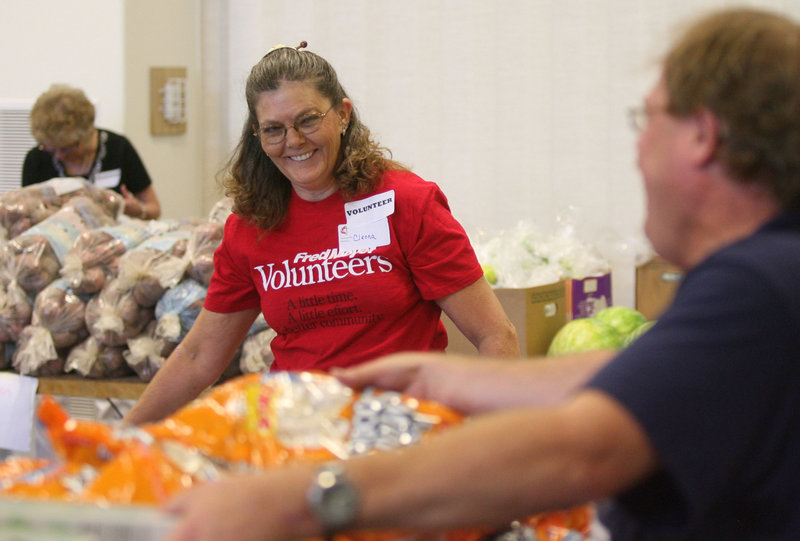KIMBERLY, Idaho – Volunteers hovered over the food-laden tables, bagging groceries and placing them into gray shopping carts.
They worked quickly and deftly snapping plastic sacks open and grabbing at produce and food staples.
The spacious room at the Crossroads United Methodist Church was filled with rows of chairs as people sat waiting for a food box, a monthly ritual for some, a first-time endeavor for others.
Dispersed among the normal group of volunteers for the Idaho Foodbank Mobile Pantry in Kimberly were Fred Meyer employees like Jillian Hernandez, a cashier who volunteered her day to help disperse the 7,670 pounds of food to more than 130 families.
“It’s different than going to work,” she said as she waited to push a cart full of groceries outside to the parking lot. “It’s a lot better feeling to know what (the food) is going toward.”
Grocery store Fred Meyer donated a check for a little more than $36,000 to the Idaho Foodbank’s Mobile Pantry program on Sept. 14. The check was presented in Kimberly to highlight what Jennifer Johnson, Idaho Foodbank vice president of development, said was a success story.
Kimberly is one of 37 mobile pantries the Idaho Foodbank operates across the state. Each operates with the goal of establishing its own permanent building in its community. It’s a goal that’s coming to fruition in Kimberly.
Crossroads United Methodist Church is partnering with other area organizations, churches and individuals to create a nonprofit organization called the Rock Creek Food Pantry. The pantry would be open for weekly distributions of emergency food in Kimberly.
Idaho has seen a 29 percent increase in the need for free emergency food, according to the Idaho Foodbank, and CEO and President Karen Vauk said her organization is preparing to meet that need for the next three to five years.
“That’s a huge increase in a 12-month time. We’re seeing no leveling off for relief,” Vauk said. “We want communities to develop their own infrastructure of support and then we do all we can to support them.”
She emphasized that the establishment of a local network of help is especially important in rural areas where soup kitchens and transportation services can be limited.
As the volunteers assisted those waiting for food on Sept. 14, the hunger to help feed families was apparent.
“As humans, we understand hunger, but if you know you have food available it’s different,” Johnson said. “There is a sense of helplessness if you can’t feed yourself or your children. We can all make a little bit of a difference and it gives people a sense of power if they donate a dollar or a can.”
Send questions/comments to the editors.



Success. Please wait for the page to reload. If the page does not reload within 5 seconds, please refresh the page.
Enter your email and password to access comments.
Hi, to comment on stories you must . This profile is in addition to your subscription and website login.
Already have a commenting profile? .
Invalid username/password.
Please check your email to confirm and complete your registration.
Only subscribers are eligible to post comments. Please subscribe or login first for digital access. Here’s why.
Use the form below to reset your password. When you've submitted your account email, we will send an email with a reset code.